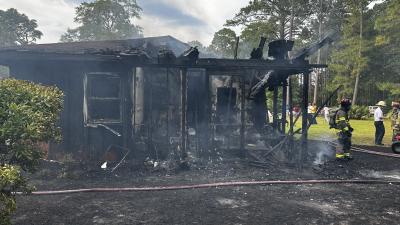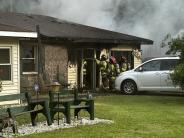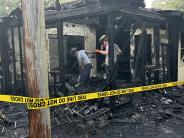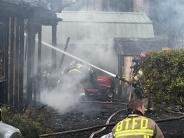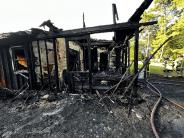Extension cord use sparks destructive electrical fire
Bluffton, SC (June 2, 2023, 10:30 a.m. EDT) – A Bluffton home and home-based daycare on Simmonsville Road experienced significant damage on Thursday evening. Firefighters from six Bluffton Township Fire District stations responded to the home at approximately 5:45 p.m. When fire crews arrived, the rear right corner of the house was fully engulfed in flames. The owner was home at the time of the fire but was not inside the residence when the fire broke out. Fire investigators determined the fire’s cause was likely due to the use of several extension cords plugged into a single wall outlet that overheated and ignited carpeting in a bedroom.
Fire Chief, Paul Boulware, said that “Many homeowners use extension or drop cords because there aren’t enough outlets for all of their electronics.” He continued, “We have a lot more devices that people keep constantly plugged in using extension cords. The danger in doing that is it overloads the cord and causes it to overheat, which can ignite a fire as it did in this home.”
According to the National Fire Protection Association (NFPA), “In 2015-2019 electrical distribution or lighting equipment, such as wiring, lighting, cords, and plugs, was involved in an estimated average of roughly 32,620 reported home structure fires per year. These incidents caused an average of 430 civilian deaths, 1,070 civilian injuries, and $1.3 billion in direct property damage annually.”
The NFPA and U.S. Consumer Product Safety Commission offer these electrical safety tips to reduce fire risk:
- Major appliances (refrigerators, dryers, washers, stoves, air conditioners, microwave ovens, etc.) should be plugger directly into a wall outlet. Extension cords and power strips should never be used.
- Use ground-fault circuit interrupters (GFCIs) to reduce the risk of shock. GFCIs shut off an electrical circuit when it becomes a shock hazard. They should be installed inside the home in bathrooms, kitchens, garages, and basements. All outdoor receptacles should be GFCI protected.
- If any part of an extension cord is hot while in use, it is a warning sign that it may be overloaded. Check if the extension cord is properly rated for the products that are plugged into it. Also, inspect the cord along its entire length to ensure it has not been damaged.
- Never alter a cord to change its length or perform inadequate repairs such as taping up damaged insulation. Do not trim, cut, or alter the plug blades in any way.
- Check cords to make sure they have been listed by a recognized national testing laboratory, such as Underwriters Laboratories (UL), Intertek (ETL) or CSA-International (CSA).
For more information about home fire safety and resources to help prevent fires, please visit the Bluffton Township Fire District website at www.blufftonfd.com. You can also follow @BlufftonFire on social media including Facebook, Twitter, Instagram, and Nextdoor.

